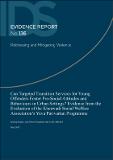| dc.contributor.author | Gupte, Jaideep | |
| dc.contributor.author | Tranchant, Jean-Pierre | |
| dc.contributor.author | Mitchell, Becky | |
| dc.coverage.spatial | India | en |
| dc.date.accessioned | 2015-05-26T14:23:13Z | |
| dc.date.available | 2015-05-26T14:23:13Z | |
| dc.date.issued | 2015-05 | |
| dc.identifier.citation | Gupte, J.; Tranchant, J.-P. and Mitchell, B. (2015) Can Targeted Transition Services for Young Offenders Foster Pro-Social Attitudes and Behaviours in Urban Settings? Evidence from the Evaluation of the Kherwadi Social Welfare Association’s Yuva Parivartan Programme, IDS Evidence Report 136, Brighton: IDS | en |
| dc.identifier.uri | https://opendocs.ids.ac.uk/opendocs/handle/20.500.12413/6167 | |
| dc.description.abstract | In Maharashtra, state-sponsored programmes that support school dropouts and young
offenders in finding employment and integrating into society are severely limited by a lack of resources and capacity. While several government-sponsored schemes do exist, in reality, however, support for school dropouts is largely provided on an ad hoc basis, and
predominantly by non-governmental organisations. In this context, we conducted a mixed-methods evaluation of Kherwadi Social Welfare Association’s Yuva Parivartan programme. This is one of the largest non-governmental interventions directed towards school dropouts and juvenile offenders.
The overarching evaluation question adopted was ‘Can targeted preventive action and
access to employment for school dropouts act as a preventive measure against delinquency and crime?’ The following five programme-specific Sub-Questions (SQ) were used for evaluation purposes:
SQ1: Is the Yuva Parivartan (YP) programme effective at imparting on youth a set of prosocial values that are consistent with job-seeking and crime-avoidance behaviours?
SQ2: Are the benefits of the YP programme reaching the population who self-report
committing a crime?
SQ3: Does the YP programme lead to pro-social behavioural changes?
SQ4: Is there a relationship between attitudes towards aggressive and/or violent behaviour, entitlement, anti-social intent and employment outcomes?
SQ5: Does the YP programme manage to instil a feeling of confidence among the trainees
about their future prospects of finding a job? | en |
| dc.description.sponsorship | UK Department for International Development | en |
| dc.language.iso | en | en |
| dc.publisher | IDS | en |
| dc.relation.ispartofseries | IDS Evidence Report;136 | |
| dc.rights.uri | http://creativecommons.org/licenses/by/3.0/ | en |
| dc.subject | Children and Youth | en |
| dc.subject | Science and Society | en |
| dc.subject | Work and Labour | en |
| dc.title | Can Targeted Transition Services for Young Offenders Foster Pro-Social Attitudes and Behaviours in Urban Settings? Evidence from the Evaluation of the Kherwadi Social Welfare Association’s Yuva Parivartan Programme | en |
| dc.type | IDS Evidence Report | en |
| dc.rights.holder | IDS | en |
| dc.identifier.ag | OT/11009/2/1/3/48 | |


